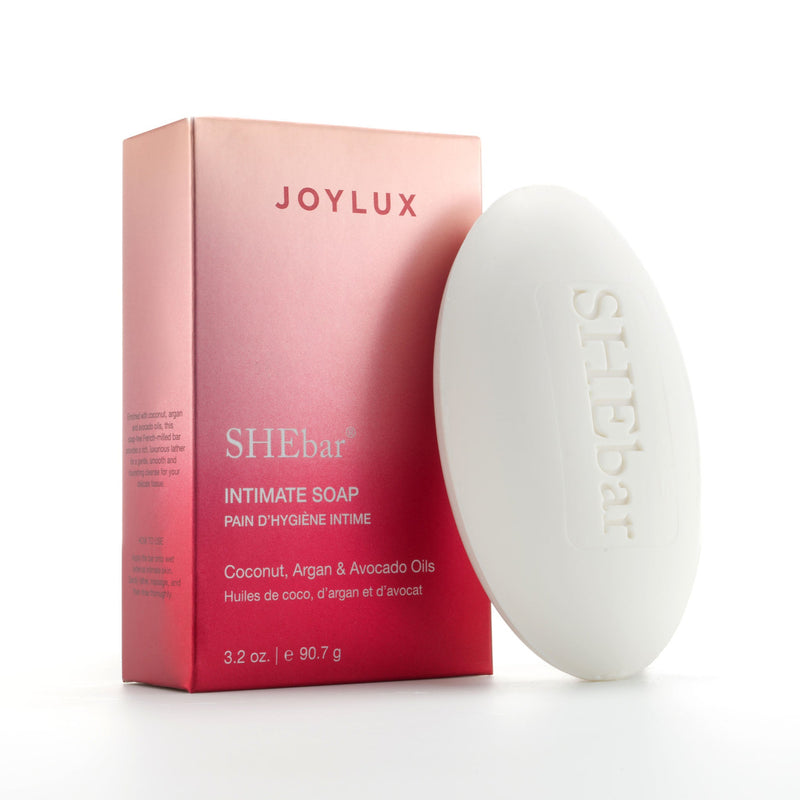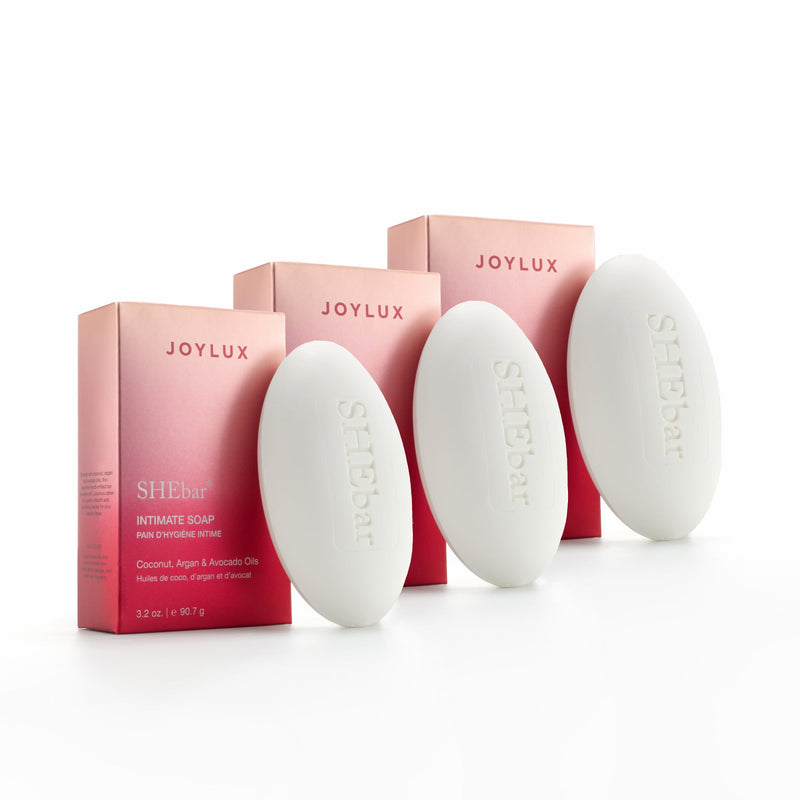
What’s The Best Soap For Feminine Hygiene?
When you walk down the personal hygiene section in the store, you’ll see soaps and products for every part of a person’s body. Among the hundreds of cleansers, shampoos, and body washes, there is usually a sad little section of soap for feminine hygiene, with just a handful of options.
With this shortage of safe and pH-balanced products, most women turn to conventional soaps.
However, these products can be harmful, particularly to the vagina and vulva. The skin in these areas is delicate. Using a soap that isn’t safe for your vaginal area can cause irritation, inflammation, and even infection.
The problem is that it can be difficult to determine which products are actually the best soap for feminine hygiene and which are simply good marketing. Shopping for the best vaginal soap or cleansing products should be just as easy as picking up soap for the rest of your body. But, it isn’t.
Before joining Joylux, I was a board-certified Ob-Gyn for over 15 years. In this article, I’ll answer the common questions I hear when it comes to soap and feminine hygiene.
What makes a good vaginal soap? What ingredients should you avoid? I’ll even cover if you actually need to use soap. If you do clean down there, what’s the best soap for feminine hygiene?
Are you supposed to wash your vagina with soap?
The feminine hygiene market encompasses everything from razors and menstrual products to vaginal soaps and douches. In recent years, the market for these products has been growing. One report estimates that it will reach $68.7 billion by 2030.
In other words, there are a lot of companies producing “feminine hygiene” products and marketing them as necessary. In reality, women don’t need some of these products at all. For example, douching is not needed or recommended. It can actually harm your vaginal pH and trigger infections, and there are much better alternatives to douching out there.
The truth is that your vagina is self-cleaning. You don’t need to wash your vagina with soap. Furthermore, if you clean improperly or use soaps that are not made for vaginal use, it can lead to health issues.
That said, we get dirty, sweat during the day, and want to feel clean. Many of us don’t feel like warm water alone will do the job and reach for the soap. Even though using soap on your vagina isn’t technically necessary, you can do it safely. First, we should clear up some anatomy.
How to clean your vagina with soap
The vagina usually takes center stage when it comes to parts of the female anatomy. People recognize the name, but oftentimes, what they are really referring to is the vulva. The vagina is the internal canal that connects the uterus and cervix.
The vulva is the outer area. It includes the external parts that are around the vagina, specifically the:
- Clitoris
- Clitoral Hood
- Inner and outer labia (or vaginal lips)
Since the vagina is internal, you don’t focus your cleansing routine there. Instead, you’re usually washing the outer area called the vulva.
While your vagina is self-cleaning, the vulva is not and could use a little extra love in the form of specially-formulated soap to help you feel fresh.
SHEbar®
Enriched with coconut, argan and avocado oils, this french-milled bar provides a rich, luxurious lather to gently cleanse your delicate tissue.
SHOP NOWThe best soap for feminine hygiene
If you're in the market for a new face moisturizer or body wash, you probably feel comfortable asking a friend or even the worker at the beauty store for a recommendation.
Asking the cashier which soap she would recommend for your vulva may be a little more awkward. After all, many women won’t even say the “V word” aloud to their OB, let alone their neighborhood cashier.
Whether you’re shopping in-store or online, here are the details you need to make the right choice for you.
Feminine Hygiene Soap: What To Look For
There are a few things that you need to know to make an informed decision about the products you're using on your body.
When we set out to launch our own line of vagina-friendly soaps and products at Joylux, we quickly realized there were A LOT of unanswered questions. Here are answers to some of the most common ones.
Liquid soap vs. bar soap
Soaps come in many colors, shapes, and sizes. The two most common forms that soaps come in are liquid and bar soap. So, which one's best? It's complicated. Many soaps, especially certain brands of bar soaps, have high pH levels.
This can pose a problem around your more intimate areas because maintaining a healthy pH balance in your vagina is important to your overall health.
Therefore, whether a soap is in liquid or bar form matters less than its pH and ingredients.
pH balanced soap
To ensure that the bad types of bacteria can’t grow, your vagina and vulva keep a low or acidic pH level. If you introduce chemicals to raise the pH level, you could end up with irritation at a minimum or even worse, an infection.
Higher pH levels in products can also dry out the skin considerably. If you’re already experiencing dryness in your vulvar tissues, you don’t want to exacerbate the issue by using a high pH soap.
Fragrance
It's understandable to think about covering up vaginal odor with some scented soap, but artificial scents can do more harm than good. Some synthetic colors and smells found in soap products can be derived from petroleum and coal tar, the latter of which has been linked to an increased risk of skin cancer.
Take the time to use soap to gently clean your vulva every shower and especially if you have been sweating, like after a workout. Sweat can cause an abnormal odor and have an unpleasant effect on your vagina. A little odor is completely normal but using ultra-fragranced products can actually mask the scent of a health issue and make matters much worse.
The trick is to find the mildest soap possible that still accomplishes the task and leaves you feeling fresh.
Gynecologist-approved
You’d think that if a company markets a soap for feminine hygiene, it should get the approval of board-certified gynecologists. Unfortunately, that is not always the case. Research the brand behind the bottle. See if they have the credentials to formulate a soap that is safe to use in the vaginal area.
For example, I’m a founding partner at Joylux and also an Ob-Gyn. Joylux’s SHEbar was made specifically to be gentle on every part of your body. It’s pH-balanced with mild ingredients, making it one of the best soaps for feminine hygiene.
Which soap ingredients should you avoid?
Many of us routinely check labels to see what ingredients are in the food we eat. You should do the same thing when it comes to soap.
Since soaps go directly onto your skin, the chemicals in them can be absorbed by the body and the vulvar tissues are particularly absorptive.
When searching for the best soap for feminine hygiene, make sure to avoid products with parabens and sulfates in particular.
Parabens
Parabens are preservatives used to prevent the growth of bacteria and mold. Although that sounds helpful, their estrogen-mimicking properties have been associated with breast cancer. I’m just talking soaps here, but parabens can be found in hundreds of health and beauty products, from makeup to food.
Sulfates
Sulfates are chemicals used in a variety of cleaning products, detergents, shampoo, soap, and even toothpaste. They are added to these products to create foam and lather. Although they are super common—as an ingredient in 90% of personal cleaning products—they are harmful to your skin, hair, and health.
Sulfates are corrosive agents. They strip away oil, often more than necessary, causing dry skin. Plus, they are known to irritate the skin, eyes, and lungs. They have also been linked to other issues like respiratory diseases when tested in high amounts.
This may go without saying, but I will say it anyway…look out for any soaps with exfoliants in them. That’s potentially painful and totally unnecessary.
You can also make sure to apply any soaps with your hand and not a loofah, which is too rough and irritating for your intimate areas.
At the end of the day, a good personal hygiene soap or cleanser has two main jobs:
- Be safe enough to use on the most fragile parts of a woman's body
- Cleanse and freshen effectively
Some are able to do those jobs better than others. The skin of your vulva and vagina is extremely sensitive. Unwanted chemicals can irritate and dry these tissues.
The bottom line is to make sure to educate yourself on the products that you are putting onto your body. Many of the products in stores—even soaps—have toxins in them. Informing yourself about what to avoid can help you limit the chemicals that you introduce to your body.
Soaps for feminine hygiene aren’t the most comfortable topic to talk about. However, even though your vulva is a small part of your body, feeling your freshest down there can boost your confidence and make you feel more comfortable in your own skin. Take care of your delicate tissues and they will thank you!









1 comment
Thank you for all the great education!!!
In my day , doctors told you nothing about your body.